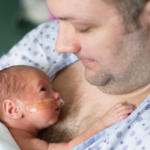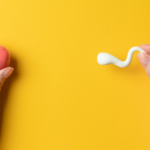What is perinatal depression?
Perinatal depression is when depressive symptoms occur during pregnancy, around the time of childbirth, and/or up until one year after birth of a child. Mothers and fathers (and other non-birthing parents) can have perinatal depression. When fathers have perinatal depression, it is referred to as paternal perinatal depression but some people also refer to it as postnatal depression.
How common is paternal perinatal depression?
Around one in 10 fathers develop perinatal depression.
Plus Paternal: Case for Change
We recognise that non-birthing parents, most commonly men, are not systematically engaged or supported when couples seek to, or have a child. And this can lead to worse outcomes for the whole family. Addressing male-specific needs requires tailored support and genuine engagement of men as equal partners throughout pregnancy, birth and parenting. You can read more about Plus Paternal and our work here.
What are the symptoms of perinatal depression in fathers?
Mothers and fathers with perinatal depression share some similar symptoms, such as feeling unhappy, tired and less active than usual.
But depressive symptoms in males and females can be different. Males are more likely to show ‘externalising’ symptoms, displayed outwardly through anger, substance use, and impulsive behavior, while females tend to exhibit ‘internalising’ symptoms, such as sadness, withdrawal, and physical signs like headaches.
Researchers and the health system have focused more on maternal perinatal depression, so it is much better understood for mothers than for fathers.
Symptoms of perinatal depression in fathers
You can find more information in our perinatal depression guide here.
What causes perinatal depression in fathers?
We do not fully understand why some people develop depression while others do not.
What men with perinatal depression might be feeling
Fathers with perinatal depression might not recognise that their feelings stem from depression, often associating those feelings with stress, powerlessness, shame, or feeling trapped.
They often try to cope with their feelings by hiding how they feel, getting on with things and accepting their negative feelings as normal consequences of their new role.
I hadn’t even told my wife a lot of the stuff I said to him about how I was feeling, and he was just like, ‘It’s classic postnatal depression symptoms.’ I felt like I was not only letting myself down, but my wife and my daughter as well.
Luke on having postnatal depression
The changes in fathers’ relationships with their partners, and the inclusion of a new baby, can be particularly challenging for fathers with perinatal depression. They can feel distant from their partner and child, and feelings of resentment and strain increase their isolation. Despite these feelings, fathers with perinatal depression still prioritise their partner’s and child’s wellbeing.
Many fathers with perinatal depression feel like others will judge them in negative ways, so they avoid seeking help. A lack of availability of support specifically for fathers stops them help for perinatal depression. Some fathers avoid seeking help because they are reluctant to begin taking antidepressant medication.

Real Story
Luke on having postnatal depression as a dad
Luke speaks about seeking help after the birth of his daughter Olive in 2018, the symptoms that were red flags in hindsight and why unflinching honesty is the best policy when it comes to mental health.
Read more
What you might be feeling about a partner’s perinatal depression
If your partner is experiencing perinatal depression you may feel concerned, confused, overwhelmed, resentful and even disappointed. It can be challenging to support a partner while pregnant, or caring for a new baby and recovering from birth. It can help to share how you’re feeling with a trusted relative, friend or health professional.
We know that paternal perinatal depression is associated with maternal perinatal depression, so if your partner is experiencing depressive symptoms, you might be too.
How to support a dad with postnatal depression
There is a lot of information on how men can support a female partner who is experiencing perinatal depression, but there isn’t much for women looking to support a new dad who might be struggling.
Seek help as soon as possible
The best thing you can do is support your partner to get help as soon as possible. Their GP, your child and family health nurse, your obstetrician, midwife or a psychologist are good places to start.
Encourage your partner to talk about how they’re feeling
Checking in with your partner and asking how they’d going can help you both be aware of any changes. If you notice they’re struggling, encourage them to talk about it, but this might not be with you. Many dads with postnatal depression don’t want to burden their partner, so a mate, a family member or a help line like PANDA (an organisation that supports the mental health of parents and families) might be easier.
Accept help from others
Let the people in your life know that you need extra support right now and suggest what they can do. People often appreciate being asked for something specific.
Perinatal depression can put an enormous strain on any relationship, even when the partner is patient, loving and supportive. Make sure you are eating well, being active and getting enough sleep to help you to feel able to provide support.













